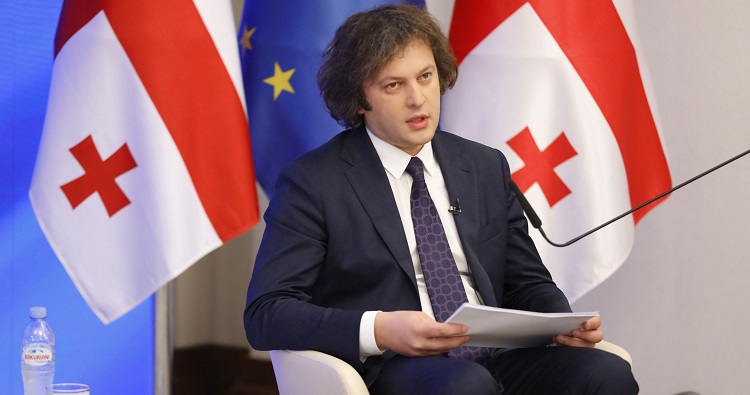Ruling party head: some opposition parties’ refusal to engage in EU conditions implementation “step against depolarisation”

In his comments while presenting a report on the implementation of the conditions, Kobakhidze noted depolarisation - one of the conditions set out by the European Commission - was the “most difficult” of the recommendations. Photo: Georgian Dream Press Office
Irakli Kobakhidze, the head of the ruling Georgian Dream party, on Tuesday said some domestic opposition parties’ refusal to engage in the implementation of the European Union conditions for granting the country the membership candidate status was a “step against depolarisation” of the domestic political environment.
In his comments while presenting a report on the implementation of the conditions, Kobakhidze noted depolarisation - one of the conditions set out by the European Commission - was the “most difficult” of the recommendations.
“The fulfilment of this priority requires involvement of various actors, including the ruling party, the opposition, [and] any individual related to Georgian politics”, he said.
What we could have seen around these 12 conditions was a proper involvement of the opposition in the implementation of these recommendations. The Parliament offered to everyone - any opposition Parliamentary party - to be involved in the working groups' activities, although several [opposition] parties refused to be involved. This was also a direct step against depolarisation”, the ruling party official noted.
Kobakhidze also noted Parliament Speaker Shalva Papuashvili had launched a “permanent monitoring of actions and statements promoting polarisation” on the domestic political scene, and offered “all interested parties to take a deeper look at the monitoring report” but only received “very limited interest”.
The ruling party head also said "any Government in any country" was interested in ensuring peace, adding “therefore, it is clear who is interested in polarisation [in Georgia]”, in reference to a part of the domestic opposition.
In fact, the problem is radicalism. When the opposition calls you 'Russian', a 'Putinist' and so on, you are forced to respond. Unfortunately, this continues. This process is a closed circle. I do not know how to break this closed circle, but granting the country the candidate status will in all cases play a very positive role in reducing the degree of polarisation”, he concluded.
 Tweet
Tweet  Share
Share